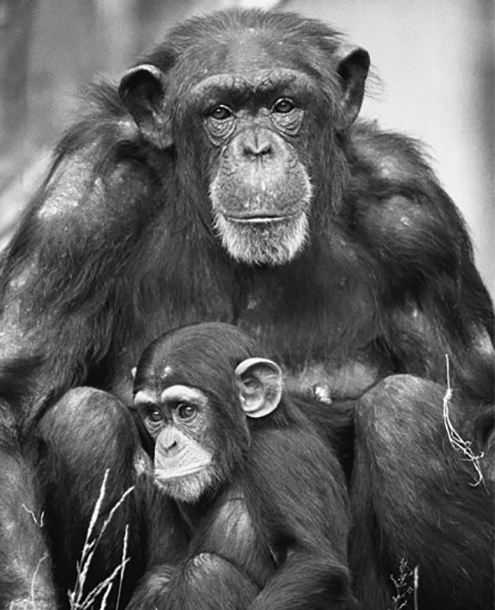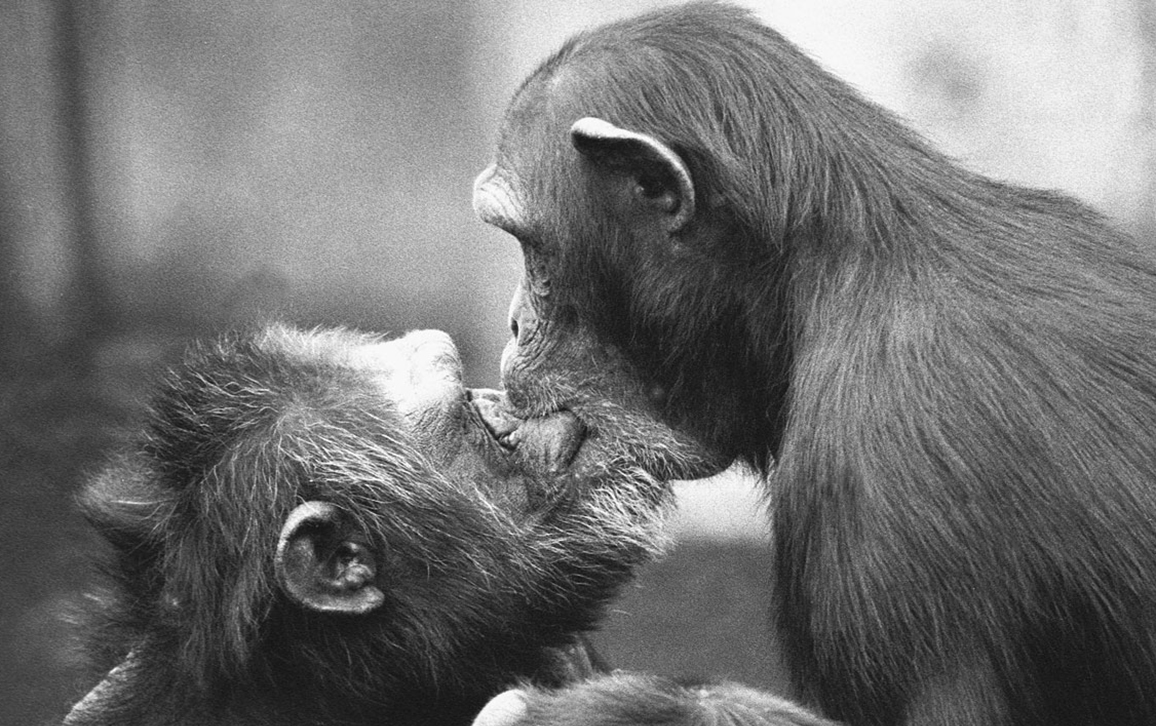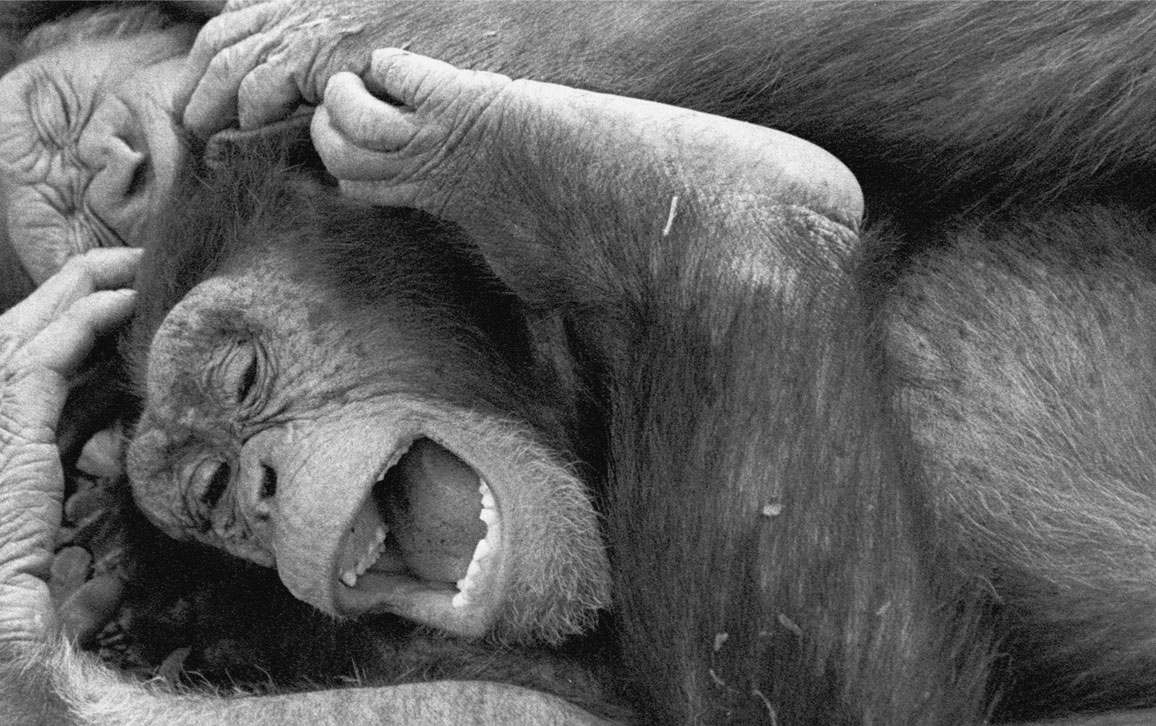
This Article From Issue
January-February 2020
Volume 108, Number 1
Page 56
MAMA’S LAST HUG: Animal Emotions and What They Tell Us about Ourselves. Frans de Waal. 326 pp. W. W. Norton and Company, 2019. $27.95.
In his latest book, Mama’s Last Hug: Animal Emotions and What They Tell Us about Ourselves, primatologist and ethologist Frans de Waal demonstrates an impressive empathy with animals. His propensity for empathy, one of his strengths, was also apparent in two of his previous books, The Ape and the Sushi Master (2001) and Are We Smart Enough to Know How Smart Animals Are? (2016); many scientists and animal lovers, including me, have found it inspiring.
De Waal’s empathy is especially notable because empathy is too often missing from the work with animals done by experimental and comparative psychologists, many of whom develop ingenious experimental designs without considering what the experiment might mean for the subject animals and whether the questions being tested have any relevance to their lives. Remarkably, de Waal’s strong empathy with animals has made it possible for him to obtain many positive results in his own research, whereas classic experimental paradigms for psychological research in animals have systematically obtained negative results. For example, many studies have used complex, opaque apparatuses to test prosocial tendencies in captive chimpanzees. Given a choice between two handles, one of which fed only the chimpanzee pulling the handle and the other of which provided food to both the actor and another chimpanzee, chimpanzees selected a handle randomly. Researchers therefore concluded that, unlike humans, chimpanzees are purely selfish. De Waal, because of his experience with chimpanzees, questioned this conclusion and developed a very simple test: Two unrelated female chimpanzees were placed side by side with only mesh between them, and one of them was given a bucket of red and green plastic tokens. Every time she gave a token of any color to the experimenter, she received a reward, but when she gave a green token, the animal beside her also received a reward. After choosing many times in a row, the chooser in a pair such as this one began to prefer green tokens to red ones anywhere from 66 percent to 90 percent of the time, showing that chimpanzees are very prosocial in such a situation.

From Mama’s Last Hug.
Mama’s Last Hug takes its title from, and opens with, a description of the apparently joyous reaction of a 59-year-old chimpanzee known as Mama when she was visited, as she was nearing death, by a biology professor who had worked with her for more than 40 years: She smiled, yelped, and embraced him, patting the back of his head and neck. This is the first of many anecdotes that de Waal offers in furtherance of his goal of convincing us of the presence in animals of emotions similar to those described in humans. He defines emotions as bodily and mental states that drive behavior (such as anger, fear, affection, and so forth) and are externally detectable through changes in facial muscle contractions, vocal timbre, heart rate, galvanic skin response, brain scans, and the like.
Particularly in the book’s early chapters, de Waal presents a large number of lively, sometimes amusing anecdotes that make for fascinating reading. An anecdote can be a good way of making a point, but readers may sometimes be left wondering whether the behavior described in the anecdote is representative of the way animals behave under the natural conditions experienced by the species. We biologists know that when searching for the mechanism underlying a pattern of behavior, one seldom observes 100 percent support for a particular mechanism. Rather, one generally observes a convergence toward one of several possible alternatives. So it can be difficult to evaluate the representativeness of the behavior described in the anecdote.
De Waal’s empathy for animals leads him to adopt the sensible attitude that when considering their capacities, we should give animals the benefit of the doubt. For instance, he suggests that “animals know more than humans think.” Some might consider this attitude to be unparsimonious. However, history has taught us that whenever we place a red line around certain behaviors or characteristics indicating that they are found exclusively in humans, new observations and data will soon come forward showing that this red line has been crossed by some animal species.
Giving animals the benefit of the doubt leads de Waal to propose some original and provocative hypotheses, including the propositions that animals show anger, shame, and even guilt. Some students of animal behavior may shake their heads in dismay at these notions, but I believe that we should take such propositions seriously and test them.

From Mama’s Last Hug.
C. Lloyd Morgan was a British psychologist who stated in the late 19th century that animal behavior should always be explained as simply as possible. “In no case is an animal activity to be interpreted in terms of higher psychological processes if it can be fairly interpreted in terms of processes which stand lower in the scale of psychological evolution and development,” he pronounced. For example, behavior that gives the appearance of being insightful or of resulting from problem-solving might actually just be a product of trial-and-error learning. In Morgan’s view, which has been very influential, animal behavior should not be considered rational, affectionate, or purposive unless there is no other way to account for it. But de Waal rejects Morgan’s canon, arguing that if we want to understand animals, a more productive approach is to be ready to test all possible alternatives, as there is no other way to evaluate them.
Biologists believe that because species evolve through interactions with their environment, the more natural an individual’s environment is, the more that individual will possess the abilities resulting from the selective pressure it has faced as it has evolved. For that reason, evolutionary biologists are likely to question de Waal’s strong emphasis on experiences with and studies of captive animals. In the early part of his career, de Waal studied the chimpanzee colony in Burgers’ Zoo in Arnhem, Netherlands, where the chimpanzee matriarch Mama was living. Later in his career, de Waal worked for decades with the chimpanzees at Emory University’s Yerkes National Primate Research Center, until he closed his laboratories there in 2018. His personal experiences in both locations—where he obtained unique, intimate impressions of chimpanzees, bonobos, and other creatures—have helped form his views of animals.
A focus on animals living in captivity made good sense some 20 years ago. But more recently, neuroscience research has shown the tremendous importance of living in a rich and demanding environment. The brains of humans and other animals have proved to be much more plastic than scientists had initially expected, and much of this plasticity is a reflection of the environment. Researchers have found that the richer and more challenging the environment is, the more developed and connected are certain areas of the brain, and the better developed are some cognitive abilities. Numerous studies have shown how plastic the human brain is and how dramatically and quickly it reacts to the specific experiences of an individual, to the point that the volume of gray matter in the brain, the number of neural cells in the white matter, and the number of connections between those cells can vary significantly, depending on whether one is, for example, a professional musician, a professional basketball player, a taxi driver, or a chess player. Changes in the structure and volume of the brain have been correlated with cognitive differences in the individuals studied in a strongly quantitative way, so that the more active an individual is in a given discipline, the larger the effect on the brain and the better the resulting cognitive performance. In studies of primates, fishes, and rats, similar important differences have been found between individuals living in standard cages or aquariums and those living in enriched conditions allowing for a variety of experiences and exercise.
How large are the effects of enrichment of the environment on chimpanzees and bonobos if we compare captive individuals with those living in the African rainforest? The findings of studies in the 1960s and 1970s typically suggested that all animal behavior patterns are predetermined and that the negative effects of captivity are negligible. Therefore, studies of animals in captivity were at that time regarded as the best ones for understanding behavior patterns and the underlying mechanisms guiding them. However, the findings of neuroscience research in the late 1990s about the plasticity of the brain and cognitive performance suggest that the opposite may be true, because the environment of wild animals is far more stimulating and unpredictable than that of captive animals.
Some scientists have maintained that we can use observations of animals living in captivity to understand the innate part of behavior that is not affected by environmental conditions. This would be a valid argument if learning were not so important in animal species, particularly primates.
Still other scientists acknowledge the detrimental nature of captive living conditions but claim that because all wild populations face tremendous threats and will disappear in the near future, studies with captive animals are our only option. Although such a pessimistic view may be forced upon us sometime in the next 40 years, adopting it now seems premature, given that so many healthy wild populations are still available for detailed observation.
Statements that de Waal makes in chapter seven of Mama’s Last Hug suggest that he belongs in the pessimistic camp. Making the argument that close interaction with animals has been good both for them and for us, he observes that “things might be different if we still had pristine habitats available for animals to disappear into, but unfortunately, this is not the world we live in anymore.” He goes on to claim that if he were an orangutan he would rather live in a zoo than in the jungles of Borneo, where displaced orangutans are treated as pests and shot. However, he does think that a law should be passed stating that primates cannot be kept captive unless all of them are housed socially rather than in single cages.
Unfortunately, our characterizations of animal species can be erroneous if we study them only in captive conditions. For example, researchers who have observed chimpanzees and bonobos in captivity, including de Waal, have described bonobos as being peaceful, cooperative, sexy, and the most empathic of all hominids, and they have described chimpanzees as being much more violent than bonobos, driven by hostility and a need to dominate. But do those characterizations apply equally well to bonobos and chimpanzees living in the wild? Do the two species react in the same way to captive living conditions?

From Mama’s Last Hug.
Studies in the wild (by John C. Mitani and colleagues, and by Martin Surbeck, myself, and others) have shown that, compared with wild bonobos, wild chimpanzees live in larger social groups and exhibit more fluid fission and fusion grouping patterns. Male chimpanzees are very cooperative, defend their territory jointly, hunt for meat in coordinated hunting teams, and regularly form coalitions, all of which behaviors are absent from the social life of wild bonobos. Furthermore, I have observed chimpanzees in the Taï forest to be extremely supportive of injured or threatened individuals for extended periods of time, and this type of behavior has never been seen in wild bonobos. No one would have predicted these drastic differences between the two species based on observations of them in captivity. And the two species seem to respond to captive living conditions very differently. So we should be wary of using observations of captive animals uncritically.
Mama’s Last Hug is a touching and vivid look into the emotional life of animals and as such is worth reading. At the same time, we are left wondering to what extent de Waal might actually be underestimating what animals are capable of in the wild and how one might go about eliciting that behavior in a way that is both empathetic and rigorous.
American Scientist Comments and Discussion
To discuss our articles or comment on them, please share them and tag American Scientist on social media platforms. Here are links to our profiles on Twitter, Facebook, and LinkedIn.
If we re-share your post, we will moderate comments/discussion following our comments policy.